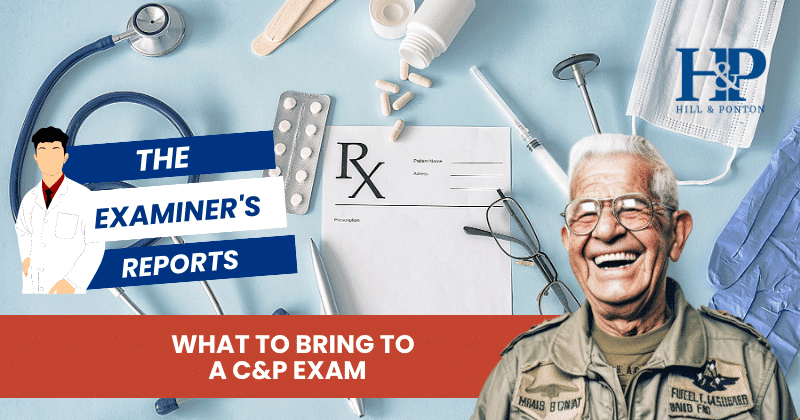
Oftentimes, veteran’s injuries are obvious. A shrapnel scar, a torn rotator cuff, or a hernia are all likely to be immediately obvious even to laymen.
But what about diseases like diabetes, hypertension, or traumatic brain injury (TBI)?
How can a veteran comprehensively display their symptoms for illnesses like Gulf War, Irritable Bowel, or Chronic Fatigue Syndromes?
After several years of examining veterans with these illnesses, I’ve learned what the VA uses in order to determine the highest rating, and sometimes it is simply a matter of getting your examiner to
- see that you have a certain related (but often hidden, or not obvious) symptom and
- document it appropriately. So how can you communicate and substantiate all these relevant findings for your examiner?
Let’s break it down by illness.
Diabetes Mellitus Type II
Type II Diabetes (DMII) is the most common form of the illness and since it is presumptively service-connected to Agent Orange exposure, it is the most common that I see in veterans.
Typically a veteran will know that they need to show up to the examination with some knowledge of their medications and most recent A1c lab reading (which tells us the severity of their diabetes), but there’s a lot more you can communicate to your examiner about the illness.
In fact, if you highlight the presence of certain symptoms, you can get your examiner to trigger additional assessments that may end up getting you multiple service-connected conditions surrounding the main issue of your diabetes.
In light of this, be sure to communicate whether you have burning, numbness, or tingling in the toes or your fingertips – this is called peripheral neuropathy and is commonly associated with diabetes.
While there may not be externally visible signs of this, the neuropathy might still be severe enough affect your balance or ability to walk!
If you’re diabetic, you should be getting your eyes checked annually for evidence of diabetic retinopathy, which is slow, progressive damage to the blood vessels in your eyes – be sure to report this to your examiner if you have it, especially if it is already affecting your vision!
Diabetic-induced nephropathy is damage to the kidneys – you may be unaware of it, but whoever is treating you for your diabetes is likely keeping an eye on it and documenting on it if it is present.
Keep in mind the criteria for establishing kidney disease with the VA is very strict, so make sure you have recent urine labs and blood work going back 1-2 years ready to show your examiner.
It’s also important to know that diabetes affects every major organ system, often in unseen ways. Heart disease, hypertension, erectile dysfunction, and many other issues often have diabetes as a root cause.
As such, you may have success if you can show your examiner that diabetes has caused the illness in question, which will allow them to spin off a new assessment (and thus a potential additional service-connected condition) during your diabetes exam.
Keep in mind that issues like these are incredibly complex and often have roots in more than just diabetes, so unless you have another doctor outside the disability system saying that it is a diabetic-induced issue with supporting rationale, it can be difficult to get your examiner to see it as such.
During a VA C&P Disability exam, an examiner should be asking you about these relevant findings, but that doesn’t mean they always will.
And since these are often hidden findings, it will help if you make it obvious for them – write down a bulleted list of issues you know your diabetes has caused and provide documentation relevant to each diabetic-related condition during the exam itself.
This will also make it much simpler for your examiner to document on the condition and hopefully establish additional service-related illnesses.
Review Hill & Ponton’s guide about Diabetes for more info!

Hypertension
Hypertension (HTN) is often referred to as “the silent killer.”
This can be because those who suffer from it are asymptomatic, but this not always the case.
It can be difficult obtaining a compensable rating for HTN because much of the rating schedule has to do with proving that you have blood pressure (BP) readings over a certain threshold.
However, if you have symptoms with your hypertension, your examiner is keenly interested in their effects on your functional capacity, especially as it relates to work and income-earning potential.
For example, do you suffer from headaches when your blood pressure is elevated?
Maybe you can show this to your examiner by keeping a headache diary which also logs your BP readings during headaches.
Do you suffer from sudden, unexplained anxiety that seems to be unrelated to your current emotional situation?
Check your blood pressure and you may find that it is acutely elevated and causing your body to go into fight-or-flight mode, which is, in turn, triggering your anxiety.
Have you had to be hospitalized and consequently lost work time due to uncontrolled hypertension?
Make sure to point this out to your examiner.
Do you get nauseous, dizzy, or short of breath when your BP is high?
All these obviously can have impacts on your ability to function, and the best way of showing it to your examiner is with detailed blood pressure/symptom logs.
Review Hill & Ponton’s guide on Hypertension for more info!

Traumatic Brain Injury
As a veteran, you’ve had a higher occupational risk for sustaining a Traumatic Brain Injury (TBI) than the general population.
Considering the types of activities you performed while in service, this is likely obvious.
What may not be obvious, however, is how suffering a TBI can affect you in a variety of different ways and for many years after the initial injury.
To kick things off, it may help to make the experience of a TBI more relatable – you may think that you’ve never been assigned such a diagnosis, but it’s important to recognize that even a concussion is considered a “mild TBI.”
Even if you’ve never had a “major” one, having multiple milder concussions can produce many of the same effects as a more significant solitary TBI.
Think back to the times you may have suffered a concussion and add them up – you may be surprised by how many times it happened!
Being evaluated for TBI for the VA requires a specialist examination – this is because the residuals of a brain injury can be difficult to detect and distinguish from other issues you may have.
What’s important for you as the patient is to bring to light all the relevant symptoms you may be suffering from.
Similar to diabetes, a TBI eval can trigger many additional assessments (and potential secondary service-connected conditions).
At first blush, it may be obvious to you that TBI can cause cognitive difficulties, memory issues, and headaches.
But do you know that a brain injury can also cause tinnitus, insomnia, dizziness, sound/light sensitivity, disturbed vision, imbalance in your gait, altered social interactions, and changes in your judgment?
It can be easier for veterans who’ve suffered a “major” TBI to attribute subtle symptoms like these to the injury, but don’t discount the fact that these could also be the result of several milder brain injuries.
Just be honest about your symptoms, provide documentation which confirms that you suffer from them, and let your examiner make the judgment call on your condition.
Check out Hill & Ponton’s guide on TBI VA ratings for more info!

Conclusion:
When it comes to certain service-connected conditions, the subtle details are what can help you obtain your deserved compensation from the VA.
The most important principle at the root of each of these conditions is to be thorough in thinking through and plotting out your symptoms – especially the ones that your examiner is most likely to be interested in.
Hopefully this article helps you identify what those are so you can have the best chance of being successful in establishing service-connected disability.







